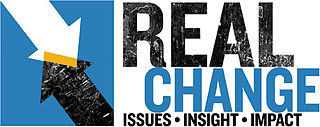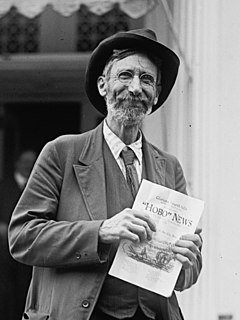
The Big Issue is a street newspaper founded by John Bird and Gordon Roddick in September 1991 and published in four continents. The Big Issue is one of the UK's leading social businesses and exists to offer homeless people, or individuals at risk of homelessness, the opportunity to earn a legitimate income, thereby helping them to reintegrate into mainstream society. It is the world's most widely circulated street newspaper.

Homelessness in the United States refers to the issue of homelessness, a condition wherein people lack "a fixed, regular, and adequate nighttime residence" as defined by The McKinney–Vento Homeless Assistance Act. Point-in-time single night counts prepared by shelter providers differ greatly from federal government accounts. In 2014, approximately 1.5 million sheltered homeless people were counted. The federal government statistics are prepared by the United States Department of Housing and Urban Development's Annual Homeless Assessment Report; as of 2018, HUD reported there were roughly 553,000 homeless people in the United States on a given night, or 0.17% of the population. Annual federal HUD reports contradict private state and local reports where homelessness is shown to have increased each year since 2014 across several major American cities, with 40 percent increases noted in 2017 and in 2019. In January 2018 the federal government statistics gave comprehensive encompassing nationwide statistics, with a total number of 552,830 individuals, of which 358,363 (65%) were sheltered in provided housing, while some 194,467 (35%) were unsheltered.

Real Change is a weekly progressive street newspaper based in Seattle, Washington, USA written by professional staff and sold by self-employed vendors, many of whom are homeless. The paper provides them with an alternative to panhandling and covers a variety of social justice issues, including homelessness and poverty. It became weekly in 2005, making it the second American street newspaper ever to be published weekly. Real Change is a 501(c)(3) non-profit organization with an annual budget of 950,000 dollars.

Street newspapers are newspapers or magazines sold by homeless or poor individuals and produced mainly to support these populations. Most such newspapers primarily provide coverage about homelessness and poverty-related issues, and seek to strengthen social networks within homeless communities. Street papers aim to give these individuals both employment opportunities and a voice in their community. In addition to being sold by homeless individuals, many of these papers are partially produced and written by them.

Street children are poor or homeless children who live on the streets of a city, town, or village. Homeless youth are often called street kids or street child; the definition of street children is contested, but many practitioners and policymakers use UNICEF's concept of boys and girls, aged under 18 years, for whom "the street" has become home and/or their source of livelihood, and who are inadequately protected or supervised. Street girls are sometimes called gamines, a term that is also used for Colombian street children of either sex.

Maraba coffee is grown in the Maraba area of southern Rwanda. Maraba's coffee plants are the Bourbon variety of the Coffea arabica species and are grown on fertile volcanic soils on high-altitude hills. The fruit is handpicked, mostly during the rainy season between March and May, and brought to a washing station in Maraba, where the coffee beans are extracted and dried. At several stages, the beans are sorted according to quality. The farmers receive credits based on the amount and quality of the beans they provide.

Fara Tanya Franki Merrett MBE is an English former footballer who played as a central midfielder for multiple clubs, as well as the English national team. A consistent goalscorer and set-piece specialist, Williams was considered one of England's leading players. After making her senior debut in 2002, Williams earned 172 caps for the England Women's Team, making her their highest capped player. She played at the 2005, 2009, 2013 and 2017 European Championships, as well as the World Cups in 2007, 2011 and 2015. Williams also featured for Team GB at the 2012 London Olympics.

Seattle is a seaport city on the West Coast of the United States. It is the seat of King County, Washington. With a 2020 population of 737,015, it is the largest city in both the state of Washington and the Pacific Northwest region of North America. The Seattle metropolitan area's population is 4.02 million, making it the 15th-largest in the United States. Its growth rate of 21.1% between 2010 and 2020 makes it one of the nation's fastest-growing large cities.

Homelessness is the condition of lacking stable, safe, and adequate housing. The definition of homelessness differs from country to country, with some countries yet to have any definition in place. People can be categorized as homeless if they are:
Put Domoi is a Russian street newspaper sold by the homeless in St. Petersburg, published twice monthly. The sellers receive half of the price. It was started in 1994 as Na Dne by Nochlezhka, an organization for the homeless. It was renamed to its current name in 2003. It was closely modeled after The Big Issue and is a member of the International Network of Street Papers (INSP). The paper has been critical of human rights violations in Russia which has made it some enemies. The INSP has been important for financial support and political legitimacy.
Street News was a street newspaper sold by homeless people in New York City. Established in 1989, it launched the American street newspaper movement. It aimed to provide a way of self-sufficiency to the many homeless and unemployed people in New York.

Hobo News, alternately "Hobo" News, was an early 20th-century newspaper for homeless migrant workers (hobos). It was published in St. Louis, Missouri, and Cincinnati by the International Brotherhood Welfare Association (IBWA) and its founder James Eads How. Hobo News was important for legitimatizing the hobo identity and has been credited as a predecessor to the modern street newspaper movement.

The International Brotherhood Welfare Association (IBWA) was a mutual aid society for hobos founded in 1905–1906. It was the second largest after the Industrial Workers of the World (IWW). It was started by James Eads How who had inherited a fortune but chose to live a hobo life. IBWA was less radical than the IWW, focusing on education and cooperation rather than direct political action. It published the Hobo News, distributed through street sellers. The IBWA was centered in the midwest and had locals in about twenty cities including Baltimore, Buffalo, Philadelphia and San Francisco. The centers, called "Hobo Colleges," offered lodging, hot meals and education. They also became important meeting places for migrant workers during the winter months.
The Homeless Grapevine was a street newspaper sold by homeless in Cleveland, Ohio, United States. It was published by the Northeast Ohio Coalition for the Homeless (NEOCH) from 1992 to 2009. Vendors bought the paper for 25 cents per copy and sell them for 1 dollar. The papers attempted to be a voice for the homeless and content was entirely dedicated to homeless issues, much of it written by current or former homeless. It was a monthly magazine of 16 pages and as of 2004 had a circulation of 5,000 copies sold by 15–20 vendors. Sellers were often at The West Side Market, Public Square, E. 9th St., East 12th and Coventry.

James Eads How was an American organizer of the hobo community in the early 20th century. He was heir of a wealthy St. Louis family but chose to live as a hobo and to help the homeless migrant workers. The newspapers often referred to him as the "Millionaire Hobo".
The history of Over-the-Rhine is almost deep as the history of Cincinnati. Over-the-Rhine's built environment has undergone many cultural and demographic changes. The toponym "Over-the-Rhine" is a reference to the Miami and Erie Canal as the Rhine of Ohio. An early reference to the canal as "the Rhine" appears in the 1853 book White, Red, Black, in which traveler Ferenc Pulszky wrote, "The Germans live all together across the Miami Canal, which is, therefore, here jocosely called the 'Rhine'." In 1875 writer Daniel J. Kenny referred to the area exclusively as "Over the Rhine". He noted, "Germans and Americans alike love to call the district 'Over the Rhine'."

Walter Julius Veith is a South African zoologist and a Seventh-day Adventist author and speaker known for his work in nutrition, creationism and Biblical exegesis.
Harald Schmied was the Head of Communication & Fundraising of the Caritas Steiermark and was the founder - together with Mel Young - of the Homeless World Cup. He was married, had two sons and lived in Graz, Austria.













